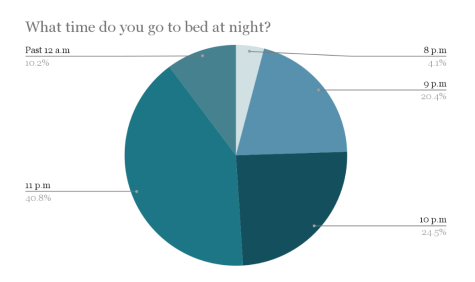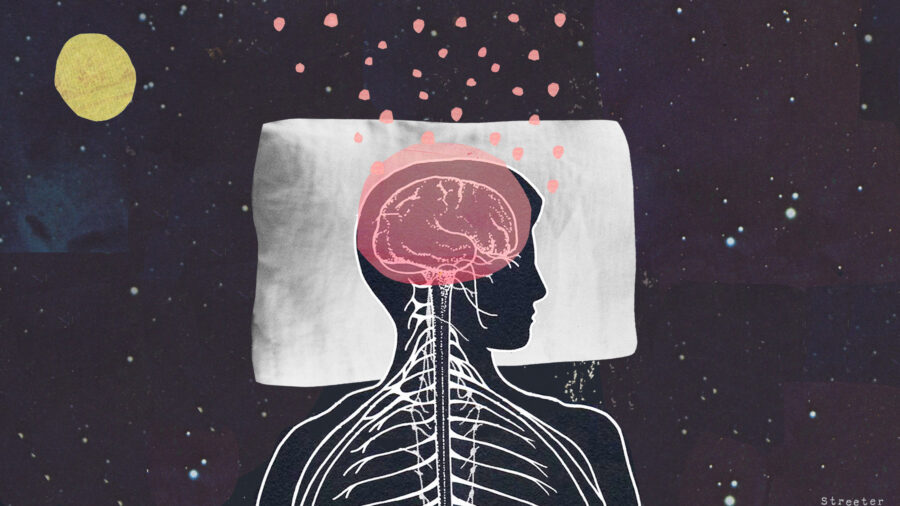Sleep Schedule
The important of getting a good night’s sleep
What do our brains do while we sleep?
Many middle school students struggle with getting the correct amount of sleep at night and often get the amount of sleep an adult, not middle school students, should be getting. For a kid, who’s body is still growing, sleep is a very important factor for proper growth and health. You might not know it, but getting a good night’s sleep is one of the, if not the most, important parts of your day. We asked many different students from different grades what time they go to sleep at night and this is what we found out.
 In this chart, we can see that more than 50 percent of students go to sleep at 11 o’clock or past midnight which is nowhere near the correct amount of sleep a teen should be getting. “At night, an average teenager should be getting at least eight to ten hours of sleep at night,” according to the Kid’s Health Organization. Let’s take a look at all the benefits of sleep and how important it really is.
In this chart, we can see that more than 50 percent of students go to sleep at 11 o’clock or past midnight which is nowhere near the correct amount of sleep a teen should be getting. “At night, an average teenager should be getting at least eight to ten hours of sleep at night,” according to the Kid’s Health Organization. Let’s take a look at all the benefits of sleep and how important it really is.
Body Benefits
The human body needs many things to survive such as food, water and, most importantly, sleep. According to the U.S. department of health, sleep helps decrease the chances of getting many diseases and disorders such as heart disease, diabetes, dementia, and it reduces the chance of a stroke. Based on the Mayo Clinic’s research, getting a good amount of sleep also strengthens the immune system which causes way less chances of getting simple illnesses such as a plain cold or a fever. Overall, sleep gives your body a break. It gives it the chance to relax and make sure it’s stronger than ever for the next day.
Personal Performance
Getting a good night’s sleep before a test or exam is extremely important for success. Not only does sleep give your body a rest, it also gives your brain a rest. Although the brain is active when you’re sleeping, it helps many of the brain functions such as your nerve cells and your hippocampus, and refreshes the brain for the next day. Doctors from The Centers for Disease Control and Prevention found “students should get the proper amount of sleep at night to help stay focused, improve concentration, and improve academic performance.” Next time you have a big exam coming up, make sure you get an extra amount of sleep.
Stress Levels
Mental health is just as important as your body’s health. Receiving a poor amount of sleep really affects your mental health. Not getting enough sleep at night is only one out of many reasons students’ stress levels are so high. Studies have shown that stress and sleep go in an infinite cycle: first you start getting stressed because of school or a sport and then you start getting less and less sleep. After that, you’re tired during the day because you didn’t get enough sleep which lowers your self esteem and makes it even more stressful. Although not getting enough sleep isn’t the biggest cause of stress, it strongly contributes to it. If you are feeling stressed, try taking a big nap and going to sleep earlier.
Mood
Especially in teens, not getting enough sleep really affects your mood in the morning. Feeling tired in the morning also affects your mood by making you really grumpy or angry. Your mood is tied into your brain function which deeply relies on sleep. Not getting enough sleep doesn’t just affect your mood, but it also affects your self-coordination and judgment.
Your mood, stress, body, and your personal performance all work together in a normal day and a normal day starts with sleep. “After a vigorous day, I look forward to shutting my eyes and getting replenished. Sleep helps my body re-start and gives me energy,” MBMS student Faith Jeppson said. The best way to start a good day is to get a good night’s sleep.

Lily Sinkus is an 8th grader at MBMS. Lily loves hanging out with her friends and enjoys going to the beach. When she's not with her friends, you can catch...







